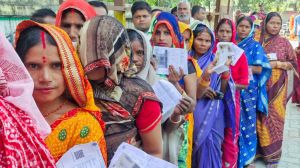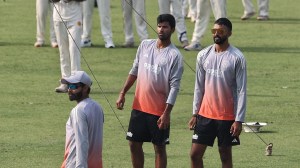M K Stalin sets up committee on protecting states’ rights, places federalism front and centre of DMK’s poll push in Tamil Nadu
M K Stalin committee For State Autonomy: Former Supreme Court judge Kurian Joseph will head the three-member panel that also includes former IAS officer Ashok Vardhan Shetty and economist M Naganathan.
 “To protect the rightful entitlements of the States and to enhance the relationship between the Union and state governments, a high-level committee has been formed,” MK Stalin said. (Source: File)
“To protect the rightful entitlements of the States and to enhance the relationship between the Union and state governments, a high-level committee has been formed,” MK Stalin said. (Source: File)Tamil Nadu State Autonomy: In a charged speech in the Tamil Nadu Assembly on Tuesday, Chief Minister M K Stalin announced the formation of a high-level committee to review and recommend measures to safeguard the rights of states and rebalance the federal structure of India, accusing the Union government of repeatedly infringing upon the Constitutional powers of states.
“To protect the rightful entitlements of the States and to enhance the relationship between the Union and state governments, a high-level committee has been formed,” Stalin said.
Former Supreme Court judge Kurian Joseph will head the panel that also includes former IAS officer Ashok Vardhan Shetty and economist M Naganathan. While Shetty, a retired bureaucrat, is known for his efficient governance style and was associated with Stalin during the tenure of the previous DMK government, Naganathan, an academic who held positions at the state planning board, is known for his close links to the DMK and had a personal camaraderie with the late Karunanidhi, the CM’s father. Naganathan accompanied Karunanidhi during his morning walks for many decades.
The formation of this committee comes amid rising tensions between the DMK-led Tamil Nadu government and the BJP-ruled Centre, especially around the issues of education policy, taxation, fiscal devolution, and institutional autonomy. Stalin’s speech was part warning, part roadmap — and unmistakably political.
‘The mother knows best’
Using a metaphor to capture the state’s growing sense of exclusion, Stalin said: “It is the mother who knows best what food to give her starving child. But if someone from Delhi decides what a child should eat, what he or she should learn, and which road he or she should walk — won’t the compassion and motherly spirit of the mother rise in revolt?”
At the heart of the speech was a pointed critique of the Union government’s use of institutions, policies, and fiscal tools to centralise authority, often bypassing or weakening the states, especially those governed by Opposition parties.
Stalin reminded the Assembly of its historic role in advocating federalism. “In every debate concerning state autonomy, the first voice has always come from Tamil Nadu,” he said.
Stalin also recalled the pioneering efforts of former CM C N Annadurai and M Karunanidhi, who set up the Rajamannar Committee in 1969 to study Union–State relations, decades before the Sarkaria and Punchhi Commissions at the national level.
“That was 51 years ago,” Stalin said, “and the key recommendations were passed as a resolution in this Assembly.” But those recommendations remain largely unimplemented, he said, asserting the need for Tamil Nadu to once again take the lead.
The current push gains significance in light of concern in Tamil parties that the state’s representation in Parliament is under threat due to the impending delimitation exercise. Because the state has successfully implemented population control measures, the next delimitation could reduce the number of its seats, a move Stalin called “punishment for success”.
“The proposed delimitation… poses a serious threat of significantly reducing Tamil Nadu’s representation — as if to punish this achievement,” he told the House.
Stalin invoked constitutional architect B R Ambedkar and US founding father James Madison to strengthen his argument:
“Both the Union and the states are created by the Constitution. Both derive their respective authority from the Constitution. One is not subordinate to the other in its own field,” he said. “The responsibility of leading India on the path of development rests majorly on the shoulders of the states … But the powers needed to implement these have been taken away from the states and concentrated in the hands of the Union Government.”
Quoting Madison, Stalin said: “The operations of the federal government will be most extensive and important in times of war and danger; those of the state governments, in times of peace and security.”
Flashpoint in shifting political terrain
Stalin’s announcement is not just a policy measure, it is a sharp political signal aimed at reframing federalism as a live electoral and governance issue ahead of the 2026 Assembly polls. It comes at a time when Tamil Nadu’s principal Opposition, the AIADMK, has formally rejoined the NDA alliance led by the BJP and Union Home Minister Amit Shah, has launched the NDA’s poll campaign a year in advance.
Politically, many of the issues Stalin raised, including the demand for greater state autonomy, opposition to the NEET exam, and criticism of GST revenue loss, were once shared by AIADMK stalwarts such as M G Ramachandran and J Jayalalithaa. Both had fiercely guarded the state’s fiscal and administrative independence and opposed central overreach, especially during the Congress rule.
Yet, with the AIADMK aligning itself with the BJP, Stalin appears to be reclaiming the mantle of the state autonomy crusader, a role with deep emotional and historical resonance in Tamil Nadu’s Dravidian political imagination.
By forming this new committee, the DMK is not just seeking policy recommendations, it is laying the foundation for a renewed federalist campaign, with potential national implications. In Stalin’s words, “Tamil Nadu … once again steps forward to fulfil its historic responsibility.”
Education, finance, and the “Hindi imposition” charge
Stalin’s speech devoted considerable time to how education, once a state subject, has now become an arena of contention. He alleged that the National Education Policy 2020 was being used to impose Hindi in the name of a three-language formula. He accused the Centre of withholding Rs 2,500 crore meant for Tamil Nadu under the Samagra Shiksha Abhiyan scheme, a move he described as a betrayal of students’ welfare.
He also criticised the NEET entrance exam, saying it “benefits only a certain section … and has shattered the dreams of rural and backward students.” A state law to exempt Tamil Nadu from NEET was still awaiting assent, he pointed out.
On finances, Stalin said Tamil Nadu receives only 29 paise for every rupee it contributes in taxes, despite being the second-largest economy in India. “Most importantly, the power of states to generate their own revenue has been taken away,” he said.
What comes next?
Stalin said the committee would deliver an interim report by January 2026 and a final one within two years. It will examine all relevant constitutional provisions, laws, and policies, and recommend ways to reclaim powers shifted from the State List to the Concurrent List.
But even before its findings, the political message is clear. The DMK has decided to take up the battle for federalism, which is no more a mere academic topic. The question of representation, resources, and respect — and who speaks for Tamil Nadu — are set to be key topics in DMK’s poll campaign. DMK strategists believe this campaign will make the AIADMK “helpless”.
“In today’s times, when dark clouds hover over the principles of democracy, the time calls for a ray of clarity and light. Tamil Nadu, which has always guided the nation whenever the need arose, once again steps forward to fulfil its historic responsibility,” Stalin told the Assembly.
“With the clear understanding that only prosperous states can create a strong nation, let us walk the path shown by Perarignar Anna (former CM Annadurai), and realise the slogan championed by Kalaignar (late Karunanidhi), ‘Autonomy to the states — federalism at the Centre’, and make the philosophy of democracy fully bloom across India,” he added.



- 01
- 02
- 03
- 04
- 05




























